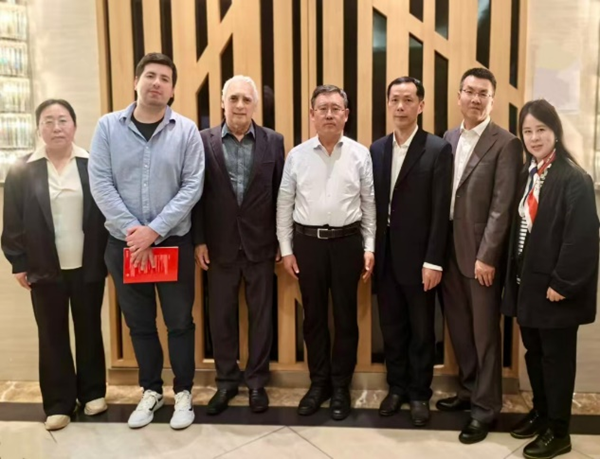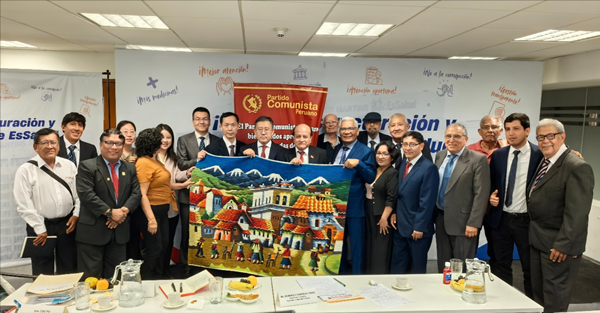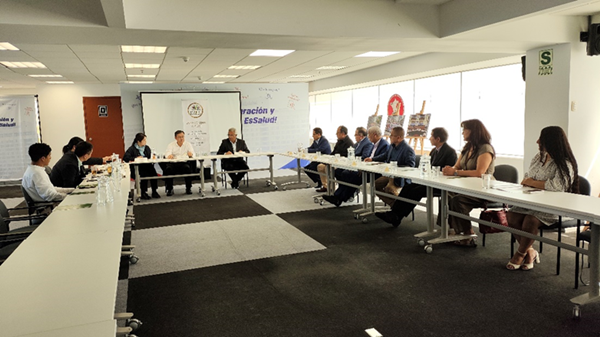From April 16 to 24, 2025, a five-member delegation headed by Xin Xiangyang, President of the Academy of Marxism, Chinese Academy of Social Sciences (CASS), visited Rio de Janeiro and São Paulo in Brazil, as well as Lima, the capital of Peru. The delegation included researchers Liu Xukuan, Liu Zhichang, and Liu Ailing, as well as associate researcher Lou Yu from the same institution.
During the visit, the delegation was warmly received by the Communist Party of Brazil and the Communist Party of Peru. They engaged in in-depth exchanges with both communist parties, as well as with multiple academic research institutions and think tanks,
Photo with scholars from Brazil
holding several academic seminars with candid discussions. The delegation also signed a letter of cooperation intent with relevant Brazilian institutions, laying a solid foundation for further strengthening collaboration between Chinese academic institutions such as CASS and the communist parties of Brazil and Peru, as well as academic research organizations and think tanks in both countries.
1. Intensive Academic Exchanges
The delegation first visited the Federal Fluminense University (UFF) in Rio de Janeiro, established in 1960 and headquartered in Niterói, where they held discussions with Fernanda Pimentel, Dean of the UFF Law School, and Associate Professor Eder Fernandes Monica. The delegation and Brazilian experts exchanged views on a series of issues related to democratic politics and legal system, covering specific topics such as China’s whole-process people’s democracy, the comprehensive advancement of the rule of law in building a socialist country, and social governance.
The delegation held discussions with the Communist Party of Peru (Unity) in Lima. At present were Domingo Cabrera Toro, General Secretary of the Communist Party of Peru (Unity), eight other members of its Central Committee including Marcelino Paucar and Ricardo Parodi, and Oliver Barrientos, member of the Secretariat of the Central Committee of the Communist Youth League of Peru.
Participants from the Communist Party of Peru (Unity) shared their perspectives and expressed gratitude to President Xi Jinping and the Communist Party of China for the inauguration of the Chancay Port. The head of the delegation, Xin Xiangyang, provided an overview of the Academy of Marxism at the Chinese Academy of Social Sciences, highlighting China’s remarkable achievements in the new era and the Communist Party of China’s efforts to strengthen international cooperation, uphold a new international political order, and promote a new international economic order.
The delegation in a symposium with the Communist Party of Peru (Unity) in Lima
The delegation visited the Peruvian Institute of Public Policy in Lima and held discussions with experts from the institute. Established in 2012, the institute is primarily composed of left-wing scholars focused on public policy research and providing advisory services to the Peruvian government and relevant departments.
The Peruvian side was represented by ten participants, including Ricardo López Risso, President of the Peruvian Institute of Public Policy. The Peruvian experts emphasized that the governance achievements of the Communist Party of China, the successes of Chinese modernization, and China’s remarkable accomplishments in economic and technological innovation are worthy of study by Peru. They stated that Peru consistently regards China as a banner, benchmark, and model for development.
The delegation in a symposium with Ricardo López Risso, President of the Peruvian Institute of Public Policy, and other scholars
The delegation held discussions with Alberto Moreno Rojas, Chairman of the Communist Party of Peru (Red Fatherland), and Arturo Ayala, member of the Party’s Central Political Bureau and Secretary for International Relations. In December 1966, Moreno made his first visit to China, where he traveled for several months, participated in numerous exchange activities, and had the honor of meeting Chairman Mao. He spoke highly of the remarkable progress of socialist China while expressing indignation at US tariff policies. Recalling his multiple visits to China, Moreno remarked emotionally, “Each trip to China has been a revelation—the country’s transformations and achievements are truly impressive.” He added, “The speed at which China has achieved its results is astonishing.” During the exchange, Moreno also reflected, “The Communist Party of China started with just over 50 members and has accomplished such monumental undertakings. Why can’t we achieve the same? The CPC’s achievements serve as our greatest inspiration.”
The delegation held a discussion with Meng Kexin, Editor-in-Chief of Peru’s La voz de la Colonia China and representative of China Today magazine’s Peru office, to learn about the lives and work of Chinese nationals in Peru and his contributions to promoting cultural exchanges between Peru and China.
During this visit, the delegation also signed a letter of intent for cooperation with the Maurício Grabois Foundation. The Maurício Grabois Foundation is one of the most important think tanks under the administration of the Communist Party of Brazil (PCdoB), with its chairmanship held by Walter Sorrentino, Vice President of the PCdoB. The foundation oversees institutions such as the PCdoB National Political Training School, the academic journal Princípios, and the PCdoB Historical Documentation Center. Walter Sorrentino noted that given the signing of the letter of intent between the Chinese and Brazilian institutions, he had high expectations for this meeting and asked the delegation to convey his greetings to Dr. Gao Xiang, President of the Chinese Academy of Social Sciences.
The delegation also visited Brasil 247, a Brazilian news website. José Reinaldo Carvalho, Editor of the International Section at Brasil 247, has visited Chinese academic institutions multiple times and participated in various academic events in China. In recent years, he has published numerous articles in Brasil 247 and other media outlets, actively introducing the achievements of contemporary China.
2. Observations and Reflections from the Visit
China and Brazil are the largest Global South countries in the Eastern and Western Hemispheres respectively. As Latin America’s biggest economy, Brazil maintains massive trade volumes with China, with even greater potential for future cooperation. From civil society to government levels, and from the Communist Party to national think tanks, Peru demonstrates a strong consensus on enhancing multifaceted cooperation with China.
Lima, a city with longstanding ties to China, boasts over 5,000 Chinese restaurants, reflecting the favorable social status enjoyed by the Chinese community in Peru. While our delegation was walking through a neighborhood en route to a scheduled meeting, a local police officer warmly stopped us to request a group photo. He repeatedly mentioned the name of President Xi Jinping with evident admiration, his respect for China’s leadership clearly visible.
China, Brazil, and Peru, as fellow emerging economies and developing nations, exhibit high complementarity in resource endowments, industrial structures, and development strategies. In recent years, bilateral cooperation has yielded remarkable achievements in trade, investment, and infrastructure development. China has maintained its position as Peru’s largest trading partner for ten consecutive years, with bilateral trade reaching $39.758 billion in 2024. The operational launch of Chancay Port—a new starting point for the “Inca Trail of the New Era”—has brought fresh hope to the Peruvian people while significantly shortening the trade route between China and South America. This deep-water port represents a milestone in South America’s connectivity with the Asia-Pacific region. Both Brazilian and Peruvian stakeholders have demonstrated strong interest in enhancing economic and trade cooperation with China. We look forward to further advancing China-Brazil and China-Peru economic collaboration through academic exchanges and commercial ties, while promoting trade and investment facilitation and diversification. Cooperation in the fields of transportation and energy with be strengthened, with priority given to green economy and technological innovation.
In the face of changes in the global governance system and new trends and challenges in regional development, strengthening inter-party cooperation and exchanges between the two sides is not only an important means to deepen China-Latin America relations, but also a practical path to promote the building of a community with a shared future for humanity. The Communist Party of Brazil and the Communist Party of Peru attach high importance to Xi Jinping Thought on Socialism with Chinese Characteristics for a New Era, and are full of praise for the great achievements of the cause of socialism with Chinese characteristics. They expressed an urgent desire and need to further strengthen interaction with the CPC, as well as theoretical and academic exchanges with academic institutions including the Chinese Academy of Social Sciences. In the future, it is necessary to further improve the mechanism of multi-level inter-party dialogues, strengthen cooperation and exchanges between political parties and related academic institutions, and enhance joint training of young people and talents, so as to cultivate a new generation of people who are well acquainted with friendly to China.
We should further enhance cultural exchanges between China, Brazil, and Peru. The three countries possess rich historical and cultural heritages, as well as diverse modern cultural expressions, offering abundant cultural and tourism resources. As one of the world’s four recognized ancient civilizations, China shares this distinction with Peru, often regarded as the “fifth great ancient civilization.” In recent years, China-Brazil and China-Peru cultural cooperation has made positive strides in artistic performances, educational partnerships, and tourism exchanges. However, there remains significant potential to deepen the scope, breadth, and innovation of these cultural interactions. Moving forward, efforts should focus on establishing a multi-tiered cultural exchange mechanism, strengthening educational collaboration, fostering innovative partnerships in arts and cultural heritage, and promoting cultural tourism exchanges.
(Contributed by Liu Xukuan and Liu Zhichang, with supporting images; translated by Liu Zixu)
 ACADEMY OF MARXISM CHINESE ACADEMY OF SOCIAL SCIENCES
ACADEMY OF MARXISM CHINESE ACADEMY OF SOCIAL SCIENCES
 ACADEMY OF MARXISM CHINESE ACADEMY OF SOCIAL SCIENCES
ACADEMY OF MARXISM CHINESE ACADEMY OF SOCIAL SCIENCES
 ACADEMY OF MARXISM CHINESE ACADEMY OF SOCIAL SCIENCES
ACADEMY OF MARXISM CHINESE ACADEMY OF SOCIAL SCIENCES


